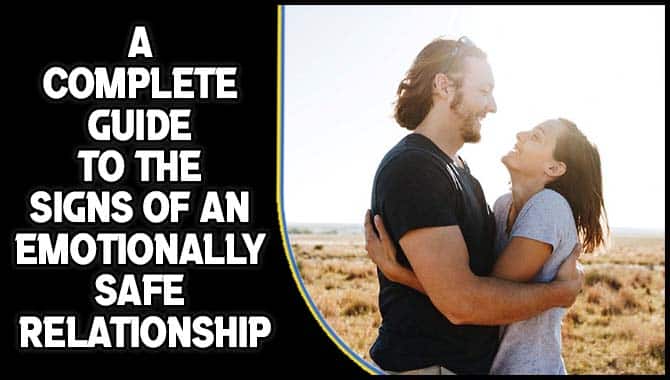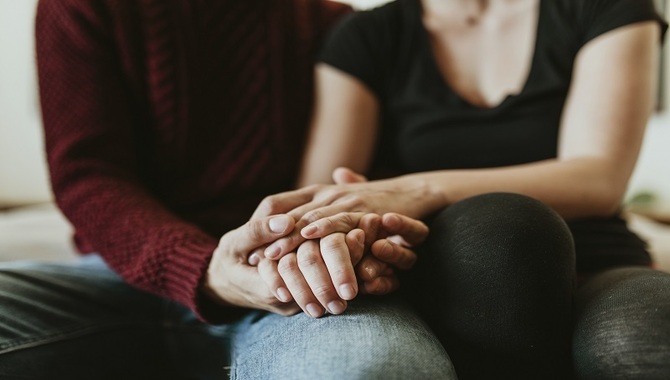In today’s world, relationships are everything. Not only do they provide us with emotional support and love, but they also help us build our social networks and learn more about ourselves.
But what makes a relationship truly safe? And how can you tell if it’s right for you? This article aims to answer these questions by providing a comprehensive guide to the signs of an emotionally safe relationship.
From defining an emotionally safe relationship to identifying if one is present, this article will teach you everything you need to know about creating a healthy bond with someone.

What Is An Emotionally Safe Relationship?
There’s something special and fulfilling about finding an emotionally safe relationship. Both partners feel comfortable sharing their emotions and needs in such a relationship. This allows for a deeper understanding and closeness. Communication is key to maintaining an emotionally safe relationship.
Without it, it may inhibit. Growth It’s important to have an open dialogue with your partner so that you can understand each other better. This allows for positive growth in the relationship. However, emotional safety doesn’t come easy it takes effort and practice to stay safe and connected. But, in the end, it’s worth it.
The 10 Steps Of Creating An Emotionally Safe Relationship

Creating and sustaining an emotionally safe relationship is a journey. It starts with understanding the signs that indicate you and your partner are in an unsafe relationship. Once you know the red flags, it’s important to take action and address them. Here are ten essential steps to creating an emotionally safe relationship:
1. Identify Your Emotional Needs And Wants.

Before you can create an emotionally safe relationship, you need to first identify your emotional needs and wants. You’ll need to understand what makes you feel good, and what brings you joy.
Once you’ve identified your emotional needs and wants, it’s time to start negotiating with your partner. This means that you need to be understanding of their feelings and communicate effectively so that both of you can get what you want out of the relationship.
2. Set Boundaries And Communicate Them.
Be clear about what is and isn’t acceptable behavior, and stick to them no matter what. If someone continues to mistreat you even after being clear about their limits, it’s time to end the relationship completely.
It’s important to have clear boundaries in order to maintain an emotionally safe relationship. Boundaries should be communicated openly and honestly, and both partners should be comfortable with them.
3. Allow Yourself Time To Heal.

It’s important not only to get your emotional needs met but also to process the pain caused by the abusive relationship. This may take some time, but you mustn’t try and rush things to regain your sanity as quickly as possible.
When it comes to relationships, it’s important to remember that they take time and effort to build. If you’re feeling emotionally unsafe in your current relationship, it’s important to allow yourself time to heal before trying to rebuild it.
4. Seek Support From Friends Or Family Members

who can provide a level of understanding and empathy that is unavailable in an abusive relationship? They won’t judge or criticize you – they’ll just offer unconditional support in whatever way they can manage.
If you’re struggling with your relationship, it can be helpful to talk to someone about it. Sometimes, sharing your feelings with a trusted friend or family member can help you work through them and come out the other side stronger. They’ll also be able to offer moral support during tough times.
5. Be Understanding And Loving.
Creating an emotionally safe relationship is a process that requires both understanding and love. Understanding means being able to see things from the other person’s perspective and not judging them. This helps you to understand their feelings, motivations, and anxieties. It also allows you to empathize with them – which is key to building trust.
6. Don’t Stay In An Abusive Relationship
Abuse is never the victim’s fault. Even if they did something wrong (which very rarely happens), they are still not responsible for the abuse inflicted on them by their partner. Because you feel you have nowhere else to go or think it’ll eventually get better. It won’t – and the longer you stay, the more damage is done, both mentally and emotionally.
7. Seek Professional Help To Heal From Your Abuse And Build A Healthy Relationship

If you’re seeking help to heal from your abuse and build a healthy relationship, then it’s important to seek professional help. This is because emotional healing takes time, and without the right guidance, you could end up making more mistakes than you ever thought possible.
Talking about your experiences with someone who understands emotional safety can be incredibly healing, even if they cannot offer physical safety from your abuser- never hesitate to reach out for help
8. Remember That Emotional Safety Is A Journey.

When it comes to relationships, we often take things for granted. We assume that because two people are in a relationship, they must be happy and content with each other. But this couldn’t be further from the truth. Creating a healthy relationship where emotional safety is the norm will take time and effort, but it’s worth every ounce of effort in the end.
9. Remember That Emotional Safety Is A Right
Emotional safety is our right, not a privilege- everyone deserves it. Don’t let anyone take that right away from you. It’s important to remember that emotional safety is a right and not a privilege. No one should have to feel afraid or uncomfortable in order to have a healthy relationship.
10. Never Feel Alone In This Journey
Creating an emotionally safe relationship is a process that takes time and effort, but it’s well worth it in the end. Nobody wants to be in a relationship that’s emotionally unsafe. It feels like there’s always this fear of being hurt, and it’s incredibly tough to cope with.
Finally, don’t forget that you are not alone in this journey – emotional safety is a global issue, and support is available to anyone who needs it.
Signs That A Relationship Is Not Emotionally Safe

There are a few signs that a relationship is not emotionally safe. Always remember that you’re not alone in this journey; there are people who understand what you’re going through and who want to help you reach your destination safely and successfully. Reach out for help when you need it.
Guard against hurtful words and behaviors; never allow yourself to be treated unfairly or abused in any way if you notice any of these signs in your relationship, it might be time to take a step back and assess the situation.
- One person constantly controls or dominates the other person.
- The couple relies too much on each other for their emotional well-being.
- There is always an imbalance of power in the relationship, with one person having more control than the other.
- The couple constantly argues about insignificant issues.
- There is a feeling of mistrust or fear in the relationship.
- The couple stops communicating entirely instead of opting to bottle their feelings up inside.
How To Identify If A Relationship Is Emotionally Safe?
A few key signs can help you identify if a relationship is emotionally safe. First and foremost, both parties should be open and honest about their feelings. They should also be willing to express anger, sadness, and frustration constructively. If either party feels like they’re constantly having to censor themselves or hide their feelings, the relationship may not be safe.
Another sign that a relationship is likely safe is if both parties feel comfortable sharing desires and dreams. This doesn’t include romance or sex; it could also involve discussing big life goals or ambitions. The relationship may be unsafe if either party feels like they’re not allowed to have honest conversations about important matters.
Finally, it’s important to agree on rules and boundaries early in the relationship. This way, both parties understand acceptable behavior and what isn’t. If one party starts to break these rules without prior warning, this could be a sign that the relationship isn’t safe.
Tips For Rebuilding An Emotionally Safe Relationship

f something bothers you enough, let your partner know without beating around the bush or putting up a defensive facade. This will help them get a better understanding of how you’re feeling and hopefully avoid any unnecessary fights or disagreements down the road.
If you’re in an emotionally safe relationship, then it’s likely that you and your partner have a lot of similarities. However, even the happiest relationships can suffer from occasional setbacks. Here are some tips for rebuilding an emotionally safe relationship:
-knowledge that things will get tough sometimes and stick together through the tough times. This will help to reaffirm each other’s trust in the relationship and make it stronger than ever.
– Communicate openly and candidly about your feelings. This will help to clear up any misunderstandings or confusion and ensure that you are on the same page.
– Be understanding and forgiving towards one another. If you’ve been wronged, be willing to give your partner time to process the situation and come to terms with it. This will help them to heal from the hurt and resentment that the event may have stirred up.
What To Do When You’re Feeling Insecure In A Relationship

If you’re feeling insecure in your relationship, there are some things that you can do to help ease those feelings. The first step is to talk about what’s going on. It’s important to communicate with your partner openly and honestly about how you feel so they can understand and support you. Writing down your thoughts and feelings may also help if you don’t feel like talking.
Try to relax: Another thing that you can do is try to relax. This may sound impossible at times, but making simple changes to your lifestyle or routine can help your mind focus on something else instead of the negative aspects of your relationship. You could also try meditation or visualization techniques to help calm and relax.
Honor and respect your partner: Lastly, it’s important to honor and respect your partner. No one deserves to be treated poorly or harshly, which is why it’s so important to listen carefully when they’re speaking and never interrupt them without asking first. Showing consideration for them will go a long way in creating a supportive and emotionally safe relationship for both of you.
list of emotional safety behaviors: To have an emotionally safe relationship, both people need to be aware of the following emotional safety behaviors:
Listening attentively: Listening carefully and non-judgmentally to what your partner is saying without interrupting or making assumptions. This makes them feel heard and respected, making them more likely to open up and share their feelings.
Not taking things personally: Being able to separate your feelings from the ideas and actions of your partner. This allows for healthy dialogue and communication.
Valuing emotional honesty: Honoring your partner’s feelings is valid, even if you don’t agree with them. This ensures they feel comfortable sharing their most vulnerable thoughts and emotions with you, which will help build trust and closeness.
Conclusion
Everyone is different and will experience different things in a relationship. However, certain signs can help you determine whether a relationship is safe. Following the ten steps outlined in this blog can create an emotionally safe space for yourself and your partner.
Read through all the sub-headings to understand emotional safety and how it can benefit your relationship. Do you have any questions or comments about emotional safety? Feel free to leave them below, and we’ll get back to you as soon as possible.
Frequently Asked Questions
1. What Are Some Of The Best Ways To Deal With Anger And Resentment In A Relationship?
Ans: When it comes to anger and resentment in a relationship, the best way to handle it is to talk about it openly and honestly. This allows both parties to clearly understand the situation and hopefully resolve the issue amicably.
Another way to deal with anger and resentment is to listen carefully to your partner. Not only will this help you better understand why they are angry, but it will also make them feel heard and understood. In many cases, violence or threats may not be the best way to handle an emotional outburst.
2. Can Relationships Ever Be Completely Healthy And Devoid Of Conflict?
Ans: Cannot attain Relationship health without containing a certain level of conflict. Healthy relationships are those in which individuals feel heard and understood, openly share their thoughts and feelings without fear of judgment or criticism, and manage disagreements constructively.
Conflict is a natural part of any relationship as it helps us learn more about each other and grow closer.
3. What Are Some Common Signs That My Partner Wants To End Our Relationship?
Ans: There are some common signs that your partner wants to end the relationship. One of the most common is if they become distant or withdraw. They may also start making destructive decisions such as cheating, lying, and verbally abusing you.
If you find these signs recurring, it’s time to seriously consider whether or not this is the right relationship for you.
4. Is It Possible For A Healthy, Loving Relationship To Go Wrong?
Ans: Yes, a healthy, loving relationship can go wrong. However, if you’re ever in a relationship that’s not fulfilling or safe, it’s important to reach out for help. There are many resources available to help you get the support you need.
5. How Can I Tell If My Relationship Is Emotionally Safe?
Ans: It’s important to assess whether or not your relationship is emotionally safe. This means that you need to be comfortable expressing your feelings, and both parties should set boundaries for how much emotional intimacy they are willing to share.
If either person feels like their needs aren’t being met, this can lead to a lot of resentment, eventually turning into anger and distance.


Leave a Reply